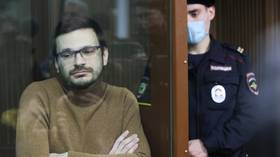
Roskomnadzor says foreign non-profits funded “information stuffing” in an attempt to destabilize society

© Sputnik/Vladimir Trefilov
Over 157,000 fakes and calls for anti-war rallies have been blocked by Russia’s media watchdog since the start of Moscow’s special military operation in Ukraine, Roskomnadzor reported on Thursday.
The regulator noted that what is called “information stuffing,” or dumping inaccurate and misleading information online, was carried out in American social media networks using the resources of foreign non-profit organizations in an attempt to destabilize Russian society. Those attempts have failed, Roskomnadzor’s deputy chief, Vadim Subbotin, said.
“Now there is a decrease in the amount of unreliable information detected in the Russian segment of the Internet,” Subbotin explained during a round table meeting on the hostile actions of the US and its allies against Moscow, including the use of colored revolutions in countries neighboring Russia.
He also noted that the number of fakes and other information stuffing in US-controlled social networks saw rapid growth during the first days of Moscow’s operation in Ukraine. The amount of such material in Russia’s internet space grew from 30 to over 5,000 posts a day, Subbotin said.

Read more
Additionally, a vast network of bots was also involved and carried out simultaneous injections of prepared fakes and massive DDoS attacks on Russian infrastructure, according to the regulator, who said the goal of these attacks was to trigger the collapse of Russia’s political and economic systems.
Subbotin noted that the decrease in the number of fakes in the Russian internet space had been caused not only by the blocking of the main resources where such information was shared, but also by their low effectiveness due to Russians supporting measures taken by Moscow.
Shortly after Russia launched its military operation in Ukraine in late February, social media networks such as Facebook and Twitter were officially blocked in the country by Roskomnadzor.
Meanwhile, Meta Inc, the owner of Facebook and Instagram, has since been designated by Russian lawmakers as an “extremist” organization for allowing posts containing death threats against Russian people, despite such content violating the platform’s own rules.




